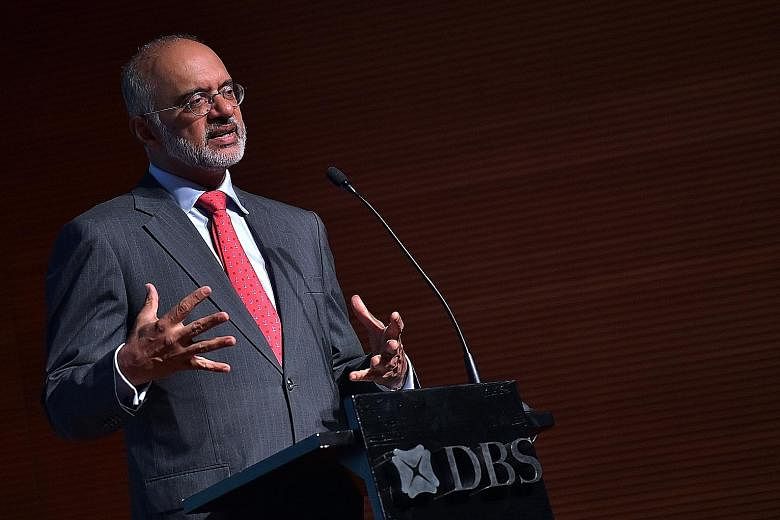China took centre stage at an investment symposium yesterday, but a decidedly mixed picture emerged.
The mainland featured strongly as a place that market experts are eyeing big opportunities, but also a market that institutional investors seemed most uncertain about.
Making the most bullish pitch for China was DBS Group chief executive Piyush Gupta, who told the gathering at the DBS Institutional Investor Symposium: "One of the biggest opportunities for the next decade is the opening up of China on the capital account.
"China's opening up of the trade account was important, but I think what is going to happen in the next 10 years will dwarf what has happened in the last five."
China's systematic efforts to integrate into global markets - marked by the landmark inclusion of the yuan in the International Monetary Fund's Special Drawing Rights currency basket last year and, next year, the inclusion of China A-shares in a benchmark MSCI index after three previous rejections - make it clear that the Chinese want to establish a global leadership position, Mr Gupta said.
"In doing that over the next 10 years, they will make a lot of stuff happen," he added, and exert tremendous impact on world capital flows.
-
MAS chief sounds warning on complacency
-
Singapore's top central banker has warned that investors may still be a little too complacent for their own good, despite some exuberance being sucked out of world markets in recent months.
Speaking at the DBS Institutional Investor Symposium yesterday, Monetary Authority of Singapore managing director Ravi Menon questioned if markets are pricing risk correctly.
"Have markets overpriced the good news and underpriced the potential bad news?" he asked.
"A striking feature of the post-crisis landscape is that while investment in the real economy has been sluggish, the appetite for risk-taking in financial assets has been voracious."
In his diagnosis, investors are extrapolating into the future current low interest rates.
"Markets appear to be expecting macro outcomes that may be inconsistent with what economies need for medium- term sustainability. In the US, markets still expect - or hope - for some fiscal stimulus in the short term, even though the economy is at full employment."
One risk that investors may be underestimating is the prospect of further labour market tightening, Mr Menon said.
"Unemployment is already around its natural rate. Past experience suggests the pass-through from labour market tightness to inflation tends to accelerate as unemployment falls below the natural rate.
"That could well lead to a faster pace of monetary policy normalisation than the market currently anticipates."
Marissa Lee
Hence DBS has set a clear business strategy to get involved in fund-raising in the Chinese capital markets, Chinese mergers and acquisitions, Chinese project finance, or taking money into China, Mr Gupta said. But he also urged tactical timing, admitting that he is "a bit more cautious on China in the immediate short term".
China still faces socio-political challenges, and deleveraging when it happens will create "a lot of choppiness", Mr Gupta said.
For this reason, DBS is pacing growth in China now while expanding in India and Indonesia.
Even so, Ms Liew Tzu Mi, GIC's chief investment officer for fixed income, believes that China has the capacity to take a lot of pain. She was responding to an audience question on whether she was concerned about a near-term debt crisis in China. "The Chinese have the ability to manage this transition well. Having said that, the problem is getting larger," Ms Liew said.
The Chinese government's balance sheet is strong, she noted, and "a lot of debt is denominated in yuan terms - it doesn't have the typical emerging-market Achilles heel of the exchange-rate problem when it comes to a crisis".
Mr Teng Ngiek Lian, chief executive of equity fund Target Asset Management, was less sanguine about Chinese equities: "I find that the A-share market is very policy-driven; it's not exactly very good for value investors like us.
"We go for valuations, but those guys in China don't look at it that way. They look at what the government says and whether the bank wants to lend them money or not," he said, offering this piece of advice: "Only do what you really know."
Mr Ravi Menon, Monetary Authority of Singapore managing director, in his closing remarks, said Asia will remain the fastest-growing region in the world, led by China and India. But he also questioned if the markets were watching the right indicators. For example, economists typically churn out lots of commentary on China's quarterly GDP growth rates.
"What ought to matter more is whether efforts are being stepped up to achieve sustained growth over the medium term - by reducing vulnerabilities in the system and implementing structural reforms," Mr Menon said.


